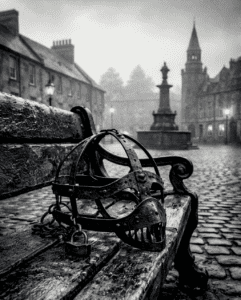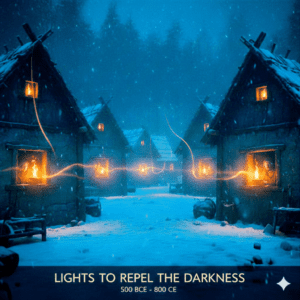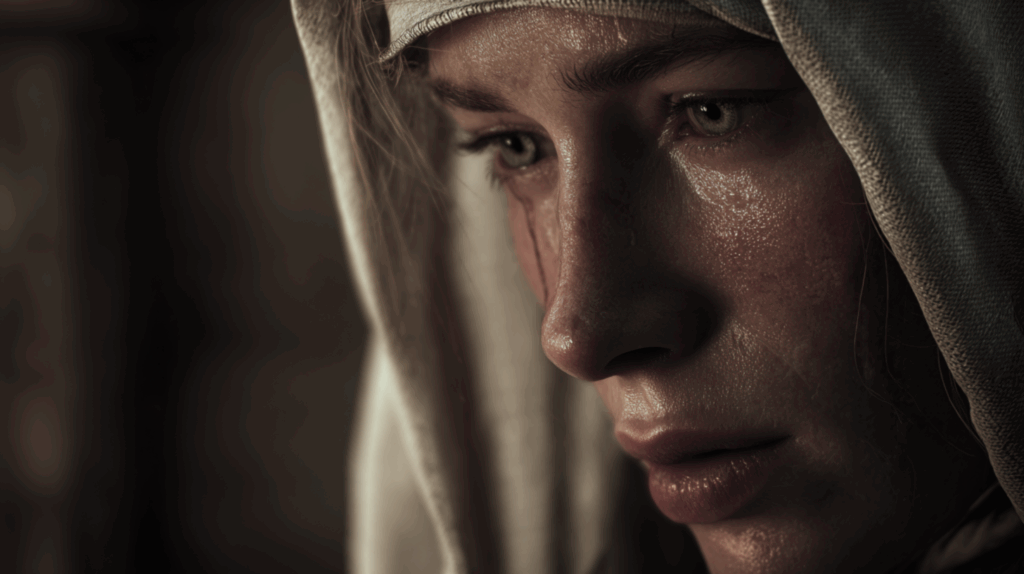
(Historical reconstruction based on documented events)
The Campus Sceleratus, Rome
c. 4th–1st century BC (recorded case: 91 AD)
Condemned for desire, a Vestal Virgin is sealed alive beneath Rome. Step into her suffocating final hours — and the archaeological silence that still holds its breath two thousand years later.
You promised them purity. They delivered a tomb.
The ladder is rough beneath your palms.
Your pale, delicate hands have never known hardship like this. Thirty years of soft robes. Ritual work. Care. And now splinters. Blood. Your hands are already bleeding from the descent. Down. Further down. The light above shrinks with each rung you descend. A rectangle of sky. Then a square. Then nothing.

Rome’s Cruellest Punishment: A Vestal Virgin Sealed in the Campus Sceleratus
You cannot believe you are here.
It’s real. So real you can taste it. The reality of it sits heavily on your chest.
How did this happen? How did you get to this place? How did one moment of wanting turn into this?
Buried alive. For noticing someone? This has to be a joke.
It’s not a joke.
The smell reaches you before your feet touch ground.
Stone. Damp. Ancient. Something that has been waiting in this chamber for a long time. Waiting for a body. Waiting for a punishment. Waiting for you.
You reach the bottom.
Your feet touch cold earth. The darkness is absolute. Complete. Suffocating. You can’t see your own hands in front of your face. For a moment, just a moment, you think maybe they’ve made a mistake.
Maybe this isn’t real. Maybe you’ll wake up in your white robes in the Temple, and this was all a nightmare.
Then you hear the ladder being pulled up.
Scraping. Metal against stone. Getting farther away. Farther. The sound of your last connection to the world above is disappearing.
The gate grinds shut.
You hear it more than feel it. Metal on metal. The sound of the world sealing you away. Of Rome turning its back. Of every door closing at once.
You are alone now.
Completely.
Utterly.
Forever.
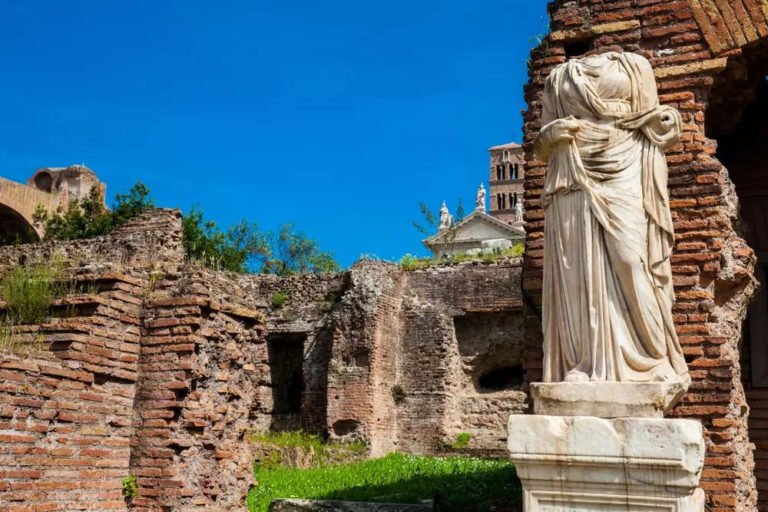
The Trial of a Vestal Virgin: Sentenced for Desire in Ancient Rome
They told you what you’d done.
Not asked.
Told.
A servant saw you smiling. Smiling. That was enough. That was your crime. Not a touch. Not a kiss. Just the expression on your face that proved you’d thought about him. That you’d wanted something other than Vesta. You wanted him. That man.
The Pontifex Maximus didn’t look at you during the trial.
He read the sentence as though reading a ledger. Immurement. Your name is struck from all records. Your body is sealed beneath the earth. The eternal flame tended by another hand, as if you had never existed.
Thirty years of service.
Erased.
They walked you through Rome at dawn.
People lined the streets. They wanted to see. To remember. To know what happens to women who want. Who desire. Who remember they have bodies.
The other Vestals didn’t look at you.
They couldn’t. To acknowledge you was to acknowledge that they, too, could fall. That they, too, were human beneath the white robes.
Now
Your feet were bare against the stone.
Cold. Each step took you further from the Temple. Further from the eternal flame. Further from anything that resembled life.
The hole was waiting at the Campus Sceleratus.
Buried Underground in Rome: A Vestal’s Chamber of Horror

There’s a lamp on the ground.
Oil.
Bread.
Water.
That’s it. Rome’s official mercy. You don’t touch any of it yet. You just stare at it. At the meagre supplies.
At the proof that they’re really doing this. Really sealing you away. Really, leaving you here to die.
Your hands are shaking. Trembling. Useless.
You light the lamp.
The flame catches, and suddenly you can see. The stone walls. The moisture glistens. The absolute, undeniable smallness of this space. Six feet long. Maybe seven feet high. A stone shelf carved into the wall like a bed. Like a place to wait. Like a place to die.
The darkness outside the lamp’s reach is thick.
Dark.
Infinite.
It presses against your skin like something alive. Suffocating. Watching. You turn in a slow circle, and the lamp throws shadows that dance and twist. Shadows that shouldn’t exist in a sealed chamber. But they do.
They multiply.
Your breathing sounds loud. Too loud. Desperate.
It echoes off the stone. You’re using up the air. You know this. You can calculate it. How many cubic feet? How many hours before the oxygen runs out? Stop thinking about oxygen. Stop calculating your own death.
But you can’t stop.
Your chest tightens. Your heart rate spikes. Suddenly, you can’t breathe properly. Each breath is shallow. Panicked. Your hands go numb. Your vision blurs at the edges. The walls are moving. Are they moving? They’re moving closer. You know they are. The chamber is shrinking. Collapsing. You’re going to be crushed by stone and your own terror.
You press your back against the wall and slide down until you’re sitting on the floor. Your hands are shaking. Your whole body is shaking. You can’t catch your breath. You think you’re dying. Right now. Right here. Before the air even runs out. Before anything else happens. You’re dying because your body won’t obey you anymore.
Then, slowly, your breathing steadies. The walls stop moving. They were never moving. You’re okay. You’re alive. You’re still alive.
For now.
They really expect you to ration water, and bread and oil and just wait.
Wait for starvation. Wait for suffocation. Wait for madness to arrive and take over your mind completely.
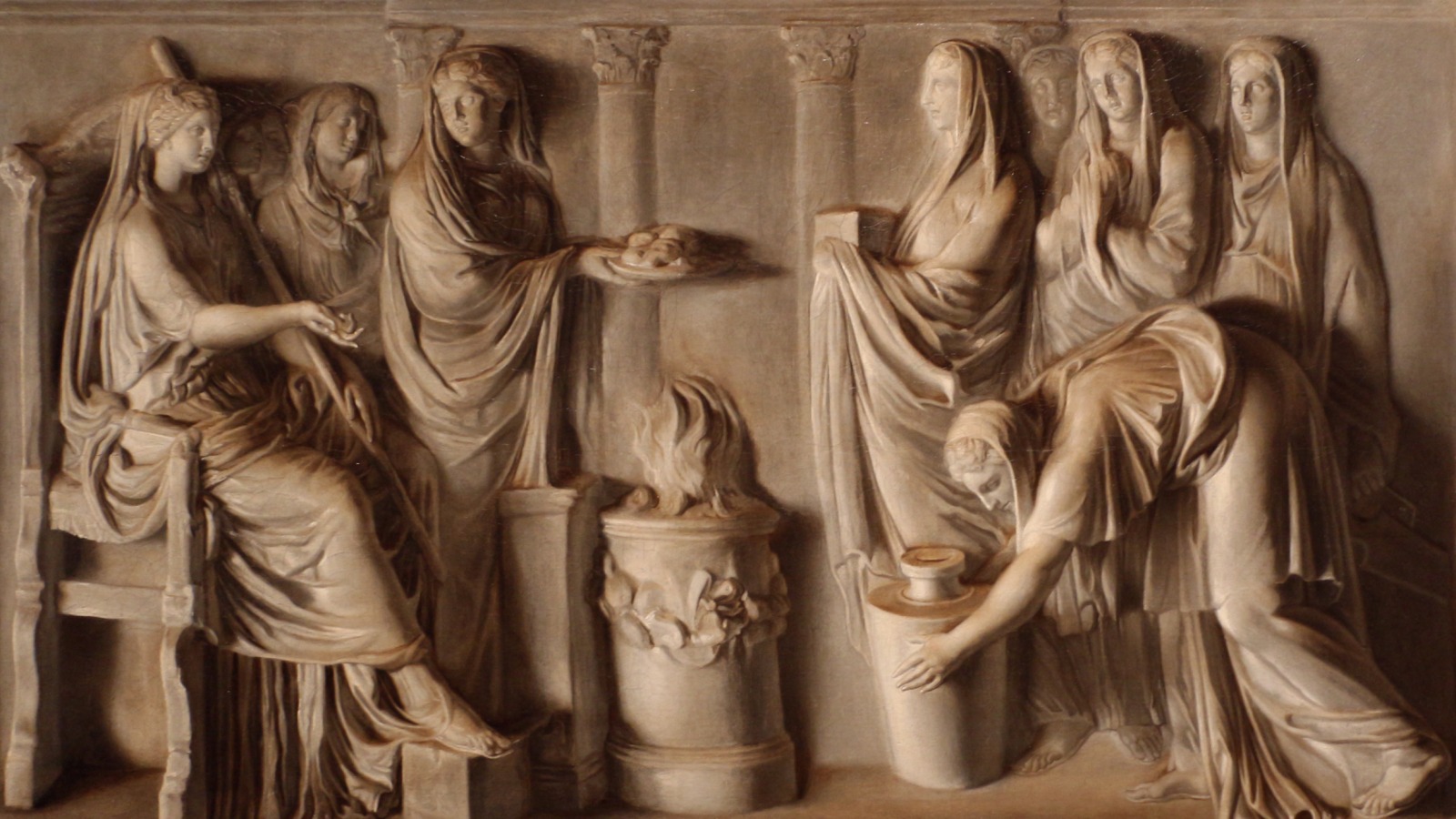
Thirty Years of Vestal Service: Rome’s Prison of Purity
You served them for thirty years.
Ten as a novice. Ten in service. Ten as a teacher. Thirty years of white robes and prayers, and the eternal flame burning whilst your own internal fire was supposed to stay dead. They took you from your mother at ten. You don’t remember her face. Just the feeling of her hands releasing yours.
They told you it was an honour.
They gave you things. Property rights. Freedom in ways other women would never know. You could own land. Make wills. If you walked through the city, traffic stopped. People bowed. They feared you. Revered you.
You were sacred.
You were also a prisoner.
The cage was marble mixed with prayer.
The Man: One Moment of Humanity
Then he came into your life.
An ordinary man. Dust on his clothes. He spoke to you once. Asked if the goddess allowed laughter within her walls. That was all. Just a question. Just the sound of his voice in a place where there was only ever silence and chanting and the crackle of sacred fire.
You answered.
You smiled.
And in that smile, something inside you that had been locked away for thirty years suddenly woke up. Something that remembered what it meant to be alive. What it means to be wanted. What it means to be a woman instead of a symbol.
But they found out.
A servant saw you smiling to yourself. A priest noticed your distraction during the sacred rites. Whispers. Accusations. And then the trial.
The sentence was final.
The punishment for breaking purity. The punishment for being human.
Panic and Suffocation: A Vestal Virgin’s Psychological Collapse
Time becomes strange in the dark.
Meaningless.
Fractured.
Wrong.
You light the lamp. You watch it burn. You think about turning it off to save the oil, but the thought of complete darkness sends panic through your chest, so you leave it burning. Watching the oil level drop. Watching your time measured in inches of diminishing light.
Your heart hammers against your ribs like it’s trying to escape. Like it knows something your mind hasn’t accepted yet. You try to control it. You try breathing normally, but the more you try, the harder it gets.
Your fingertips can touch both sides if you stretch your arms. That shouldn’t bother you, but it does. It bothers you more with each passing hour. The closeness. The knowledge that there’s nowhere to go. Nowhere to run. Nowhere to escape.
You pace.
Three steps, one direction. Three steps back. Over and over again. Your feet make a pattern on the stone floor. A groove of your own making. Proof that you existed here. That you paced. That you refused to sit still.
But you do sit still eventually.
Your legs won’t hold you up anymore. Your mind won’t hold anything anymore. You collapse on the stone shelf and stare at the lamp. Watching. Waiting. Dying.
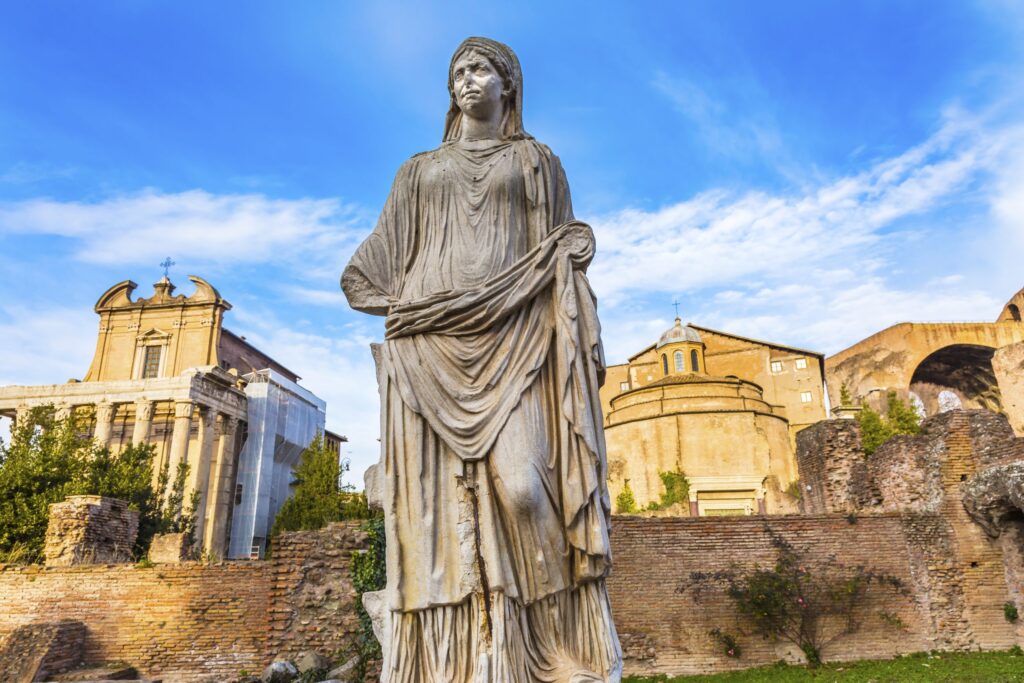
The Cycle
Your breathing slows.
Your heart settles. For the first time since the gate sealed shut, you feel almost calm. Almost okay. The panic was just panic. It wasn’t real. The air is fine. You’re fine. Rome wouldn’t actually let you die. There’s a reason. But you know, deep down inside, the reason is that you are going to die. You are being punished here alone in this cell. They called it a room, but it’s more of a tomb.
At times, you scream.
Raw. Anguished. Your voice echoes off the stone and comes back at you multiplied. Distorted. You scream again. And again. Until your throat bleeds and you can’t scream anymore.
And no one hears you.
The cycle begins again.
Panic. Gasping. Heart hammering. Then a moment of clarity. Then the realisation that clarity won’t save you. Then, the worst panic than before.
Each cycle crushes you a little bit more.
Each cycle makes hope a weapon against you.
The Anger
At some point, the fear turns into rage.
Hot. Terrible. All-consuming.
You are going to die in a stone box because you smiled at a man. Because you wanted to be wanted. Because you were human, and that was your crime. Except you don’t really know that now, but we do, thousands of years later. You just think you are a sinner.
We know you were human.
For thirty years, they owned you.
Stripped you of your name. Your family. Your body. Your future. They dressed you in white robes and called it an honour. They made you tend an eternal flame whilst your own internal fire was supposed to stay dead. They told you that purity was power whilst stripping you of every actual power.
And your crime was one smile.
One moment of being alive.
You want to claw your way out of this tomb and burn Rome to the ground.
But you can’t even escape this chamber.
Your hands are bloody. Your fingernails are torn. You’ve been clawing at the walls for hours. Or days. You’ve lost track. But the walls don’t give. Roman engineering. Perfect. Seamless. Designed so you can’t escape.
Designed so you can’t be heard.
You collapse again.
Your voice is gone now. Hoarse from screaming. Your hands are useless. Your mind is fracturing. Time has become meaningless. You don’t know if you’ve been down here for hours, days, or weeks.
The lamp still burns.
That’s all you know for sure. The lamp still burns. The oil still hasn’t run out. The light still exists.
Until it doesn’t.
Finding this story disturbing? You would also enjoy the account of the Roman gladiator and the hell they went through. Here!
Death in Darkness: The Final Hours of a Vestal Virgin
The lamp flickers.
Gutters. Dies almost.
Your heart stops. The flame is blue now. Guttering at the edges. The oil is almost gone. How long? Hours? Minutes? You have no way to know.
You try to calculate.
Measure. Ration.
But the lamp burns what it burns. You can’t control it. You can’t slow it down. All you can do is watch it die. All you can do is wait for the moment when the light disappears and there’s only darkness left. Only silence. Only the absolute, final knowledge that you’re going to die alone in this chamber, and no one will save you.
You whisper his name.
The man whose question got you killed.
You say his name into the darkness like a prayer. Like a confession. Like a last goodbye to anything that ever made you feel alive. To anything that ever made you feel like a woman instead of a symbol. To anything that proved you were human.
“I’m sorry,” you whisper.
But you’re not sorry.
Not now.
Not ever.
Your back is against the cold stone shelf.
You press your palms flat against it. Cold. Hard. Unforgiving. This shelf has held bodies before. This chamber has swallowed women before. This is what Rome does to girls who remember they’re human.
Your breathing slows.
Settles.
Surrenders.
Not because you’ve found peace. Because you’ve given up. There’s no more fight. No more hope. No more panic. Just acceptance. Just the knowledge that you’re already dead. That you died the moment they sealed the gate. That everything now is just waiting. Just watching the light fade. Just surrendering to the inevitable.
The lamp flickers again.
Weakens. Dims.
You watch it. The flame is shrinking. The oil is depleting. The light is diminishing into nothing. Yes. This is how you’ll go. Quietly. Without struggle. Without confession. Without anyone knowing you existed at all.
The last light.
It’s almost gone.

The Historical Reality
No chamber has ever been found beneath the Colline Gate.
No skeletal remains. No sealed doorway. Nothing.
Yet ancient Roman historians described it with absolute precision. Livy. Plutarch. Aulus Gellius. Dionysius of Halicarnassus. They all recorded the same ritual. The underground chamber. The bread. The water. The sealed entrance. They wrote of it as fact. Not legend.
Was it real?
What we do know is that more than one Vestal Virgin was executed over the centuries. The Roman Emperor Domitian was responsible for executing at least four during his tyrannical reign. The most famous was indeed in 91AD when he executed the head of the Vestal Virgins: Cornelia.
Cornelia was accused by Domitian of having broken her vows with his political enemies. For historians of the time, it was politically motivated as it gave Domitian the opportunity to execute his political enemies. However, Cornelia was indeed entombed alive as her punishment. She was sent into that chamber and had to wait until she met her end. According to sources, she proclaimed her innocence throughout.
But even though we may not know everything that happened, and what was made up to control the population, the Romans believed it was real. And belief, in Rome, had the weight of law.
Whether or not an actual chamber exists, the psychological terror was absolute. As archaeologists say, lack of evidence does not mean it didn’t happen.
For any girl chosen as a Vestal Virgin at age ten, this was the threat. This was the cage. This is what happens if you fail to be perfect. If you failed to be pure. If you failed to suppress the human need to be loved, seen, and wanted.
The Campus Sceleratus may still sleep under the streets near today’s Piazza della Repubblica.
Unseen. But imagined by millions over centuries.
And somewhere beneath the dust of Rome, the question still echoes:
Who could do this to a human being?
Who could seal a woman alive for the crime of being human?
And how many of us still live in the invisible chambers Rome built?
Further Reading and Historical Sources
Interested in learning more about the Vestals and ancient Rome’s treatment of women? These works provide deeper context and substantiation for this article.
Essential Reading:
Mary Beard, Religions of Rome (Cambridge University Press, 1995) – A comprehensive examination of Roman religious practices, including the role and fate of Vestal Virgins. Available on Amazon
John Erdkamp, The Roman Armies: The Dynamics of Military Life from the Republic to Empire (Edinburgh University Press, 2015) – Explores Roman society and its brutal systems of punishment and control. Available on Amazon
Primary Sources (Ancient Texts):
Livy, Ab Urbe Condita (Book 8.15) – The original historical account of immurement as legal punishment
Plutarch, Numa (Book 10) – Detailed description of the underground chamber and ritual
Aulus Gellius, Attic Nights (Book 1.12) – Philosophical examination of the ritual’s moral implications
Dionysius of Halicarnassus, Roman Antiquities (Book 2.67) – The funeral-like procession and sealing of the chamber
Recommended for Context:
Suzanne Dixon, The Roman Family (Oxford University Press, 1992) – Understanding women’s limited autonomy in Roman society. Available on Amazon
Anthony Birley, The People of Roman Britain (University of California Press, 1979) – Broader context on Roman law and execution practices. Available on Amazon


